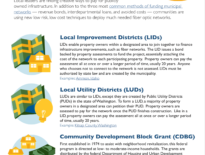Updates, Updates
Gigabit connectivity is coming on the heels of another improvement for OptiLink subscribers. This fall, officials at Dalton Utilities launched their new video product, VidLink. Hank described that the old video equipment needed a facelift after providing services to the community for 15 years.
With VidLink and the new subscriber base it began to attract, and the desire to give Dalton the economic development tools for a truly tech-centered economy, network officials decided it was time to expand gigabit connectivity. They had offered the service to businesses for about four years and on November 19th, 2018, officially launched residential symmetrical gig service.
Residential GIGLink service is an affordable $79.95 per month when bundled with VidLink and voice. Stand alone GIGLink service costs $84.95 per month.
Households can still sign up for three other symmetrical tiers as low as $41.95 per month for 50 Megabits per second (Mbps). Bundling with voice and video saves subscribers $5 per month.
It All Began With SCADA
Dalton Utility customers have enjoyed OptiLink since 2003, but the fiber infrastructure took root in Dalton in the 1990s. Like many other municipal networks that have been serving subscribers since the early 2000s, Dalton Utilities needed better communications between facilities and the ability to better manage and control their electric, gas, water, and wastewater utilities. They developed their Supervisory control and data acquisition (SCADA) system; soon some of the larger local businesses were approaching Dalton Utilities requesting connectivity. As a major center for carpet manufacturing, some of the community’s largest employers needed the kind of high-speed connectivity a fiber network could provide.
Within a few years, community leaders recognized the economic development potential of a citywide fiber optic network. By 2003, OptiLink was serving the entire city and a few of the smaller areas beyond Dalton where rural population centers obtain services from Dalton Utilities.
Not All About Gaming and Netflix
“We have offered Gigabit service to our large business customers since 2014,” noted [Hank] Blackwood. “We have upgraded our network to enable a Gigabit to our entire community because we recognize that high-speed connectivity is an essential service inside the home. We also realize that Gigabit internet is an economic development tool that drives businesses to relocate to places where they can get the bandwidth they need.”
Dalton’s economy still retains manufacturing, but now it has diversified as entrepreneurs, including home-based businesses, are taking advantage of OptiLink. As Hank described in his conversation with Christopher, Dalton wants their new status as a Gig City to continue to bring tech innovators and employers to town. Dalton Utilities has plans to offer 10 Gig residential service in the future, a move to support their long-term vision.
Listen to Christopher and Hank Blackwood in episode 332 of the Community Broadband Bits Podcast.
This article was originally published on ILSR’s MuniNetworks.org. Read the original here.
Photo via Wikimedia Commons.





